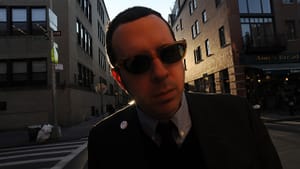Tomorrow never knows
Remembering music writer, author, and playwright Marc Spitz

It’s always strange -- at my age, anyway -- when a former classmate dies. You figure you all have plenty of time, and you recall them through an overlay of old, tangled feelings. This week, writer Marc Spitz died in his sleep at age 47. We were classmates at Bennington College. (He was actually a year younger, but the school is so small it hardly matters.)
I barely knew Marc, and we hadn’t spoken in at least 25 years. But one summer, when we both stayed on in North Bennington after classes ended, we spent a couple of weeks hanging out, developing crushes on each other, and talking about music. Before he was the black-clad, sunglasses-at-night, chain-smoking downtown playwright/music columnist and author so many of his later friends have recalled in a cascade of Facebook posts, he was a black-clad, chain-smoking 18- or 19-year-old kid who seemed hard and intimidating from a distance, but was surprisingly sweet.
The morning after I heard the news, I woke up with a memory that had fought its way out from beneath the buried decades: I loved the Beatles back then and still do; I've passed that enthusiasm to my kids, who never get sick of listening to them. But I’d forgotten about the time we sat on his floor taking turns on the stereo, and Marc queued up “Tomorrow Never Knows.”
This charming man
Somehow I'd made it all the way to college without ever listening to all of Revolver. Marc was thrilled he’d turned me onto something new. There, at the birth of grunge, I couldn’t believe what I was hearing from Lennon and McCartney. When Marc went home for the weekend, he let me keep his Revolver CD until he returned; I’m pretty sure I listened to it the whole time he was gone. It’s still my favorite Beatles song and became so much a part of me that, until Marc died, I’d forgotten how it got there. How rare and sacred is it to remember the moment you first heard a song? Marc knew -- and he built a career around that knowledge.
After those couple of weeks, Marc disappeared from my summer and we never really spoke again. Except on one spring day, when he had a bunch of his belongings spread out for sale on a hill facing Bennington’s Commons lawn. He sat surveying the scene, dressed in black, wearing sunglasses, and smoking. I summoned my courage (we probably hadn’t exchanged a word in two years) and went over, figuring I’d be nice and help him out. He was selling a copy of Aperture’s Diane Arbus: Magazine Work. Once again, I was blown away. I knew Arbus and loved her work, but this was a whole new portal (this was the 1990s, remember, before the Internet took over). “This is amazing,” I said.

And then that sweet kid was back. “Yeah, I don’t really want to sell it,” he answered. He still took my five bucks, though. "Just take care of it," he asked. I did. It’s still one of my favorite books, and I recently passed it on to my daughter, a Drexel photography major.
I mentioned to my son, a high-school kid and voracious student of hip-hop, indie music, and music writing that a college acquaintance had died. He asked who it was. When I told him, he said, “Oh, I know him. I follow him on Twitter.” Marc read Lester Bangs, and my kid read Marc. That’s amazing and inspiring, and I wish I could tell Marc what an impression he’s still making.
Hard to explain
It seems disingenuous to write something about someone who’s dead that you didn’t say to them when they were alive. Marc was slated to participate in the 24-Hour Plays fundraising benefit, scheduled for February 20, 2017, in memory of another classmate, Spencer Cox, a world-changer in his own right who saved thousands of lives through his HIV/AIDS research and activism. I was looking forward to seeing Marc there and saying hello, but that’s not what I should have said.
I should have said, “Thanks for your passion for the arts and arts journalism. Thanks for keeping the form relevant and alive, and for bringing it into your novels and plays. Thanks for showing that arts writers, those of us who spend our careers turning people onto stuff we think is cool and telling them why, can make a difference not just now, but on into the next generation. And thanks, especially, for showing me, in that brief bit of time, that if I looked deeper into what I thought I already knew, moved past comfort and nostalgia, I’d find so much more there waiting to be discovered.”
It’s knowledge I imagine he brought to his biographies of well-trod subjects such as David Bowie and Mick Jagger and to his own novels and plays. It has certainly gotten me through countless Hamlets. Now, as I consider how much our brief encounters ultimately affected me, I think it’s knowledge worth remembering every day of what’s left of our lives.
Sign up for our newsletter
All of the week's new articles, all in one place. Sign up for the free weekly BSR newsletters, and don't miss a conversation.

 Wendy Rosenfield
Wendy Rosenfield